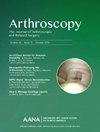Editorial Commentary: Multimodal Analgesia for Rotator Cuff Repair Should Be Individualized Based on Surgical Location and Complexity and Patient Comorbidity
IF 5.4
1区 医学
Q1 ORTHOPEDICS
Arthroscopy-The Journal of Arthroscopic and Related Surgery
Pub Date : 2024-10-01
DOI:10.1016/j.arthro.2024.06.010
引用次数: 0
Abstract
Multimodal analgesia in arthroscopic rotator cuff surgery is commonly used for pain control and to reduce opioid consumption in the early postoperative time and the days following. Indeed, the combination of local anesthetic peripheral nerve blocks and systemic or oral analgesics ensures a better outcome than the isolated use of nonsteroidal anti-inflammatory drugs. In particular, intrascalene block has significant advantages in more complex procedures involving the anterior aspect of the shoulder. However, intrascalene block should be discouraged under conditions of respiratory comorbidity such as severe chronic obstructive pulmonary disease, obstructive sleep apnea, and morbid obesity. In such cases, a multimodal approach based on periarticular infiltration analgesia combined with pharmacologic therapies can ensure excellent pain control with limited use of opioids in the immediate postoperative period. When selecting the best therapeutic combination, it is essential to consider factors that can determine the best balance between safety and effectiveness, such as the complexity of the surgical procedure, preoperative pain, and any comorbidities that could contraindicate the use of certain medications or that could be negatively affected by potential complications or side effects of the analgesic therapy.
肩袖修复术的多模式镇痛应根据手术位置、复杂程度和患者的合并症进行个体化。
关节镜肩袖手术中的多模式镇痛通常用于术后早期和术后数日的疼痛控制和减少阿片类药物的用量。事实上,与单独使用非甾体类抗炎药物相比,将局部麻醉外周神经阻滞与全身或口服镇痛药结合使用可确保更好的疗效。尤其是在涉及肩部前侧的复杂手术中,肩胛内阻滞(ISB)具有显著优势。然而,在呼吸系统合并症(如严重的慢性阻塞性肺病、阻塞性睡眠呼吸暂停和病态肥胖)的情况下,应避免使用 ISB。在这种情况下,以关节周围浸润镇痛(PAI)为基础,结合药物疗法的多模式方法可确保在术后初期使用有限的阿片类药物,从而达到良好的疼痛控制效果。在选择最佳治疗组合时,必须考虑能够决定安全性和有效性之间最佳平衡的因素,如手术过程的复杂性、术前疼痛以及可能禁忌使用某些药物或可能受到潜在并发症或镇痛疗法副作用负面影响的任何合并症。
本文章由计算机程序翻译,如有差异,请以英文原文为准。
求助全文
约1分钟内获得全文
求助全文
来源期刊
CiteScore
9.30
自引率
17.00%
发文量
555
审稿时长
58 days
期刊介绍:
Nowhere is minimally invasive surgery explained better than in Arthroscopy, the leading peer-reviewed journal in the field. Every issue enables you to put into perspective the usefulness of the various emerging arthroscopic techniques. The advantages and disadvantages of these methods -- along with their applications in various situations -- are discussed in relation to their efficiency, efficacy and cost benefit. As a special incentive, paid subscribers also receive access to the journal expanded website.

 求助内容:
求助内容: 应助结果提醒方式:
应助结果提醒方式:


